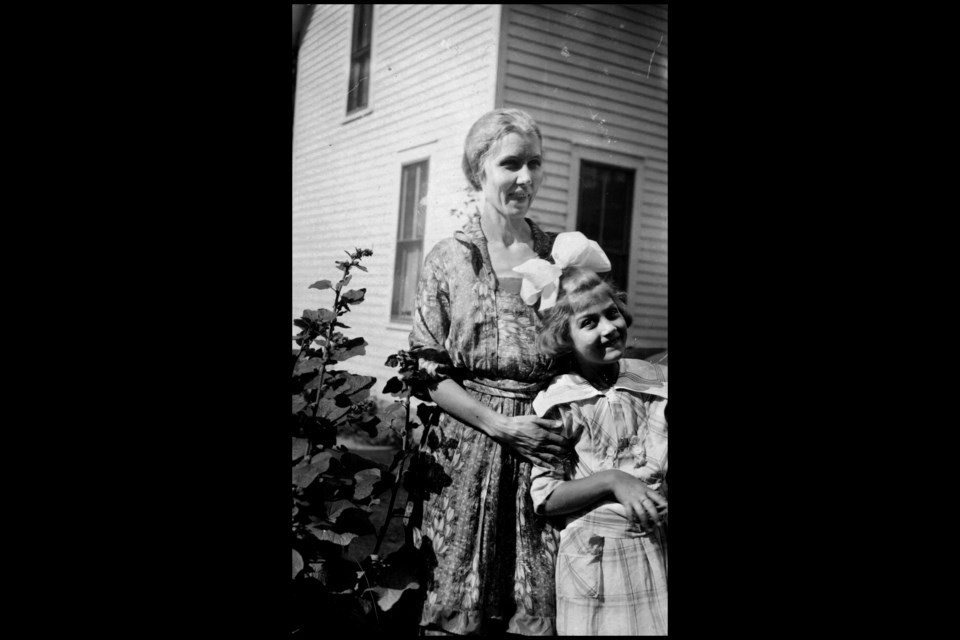This content was originally published by the Longmont Observer and is licensed under a Creative Commons license.
Written by Al Pace
Al Pace is a resident of Longmont and attends the writing group at the Longmont Public Library. His friend Steven Weber told him the story about the house where he grew up and Al decided that it was a great story to share.
The seemingly ordinary shell of a white farmhouse stands across Route 119 from the new UCHealth Longs Peak Hospital, so unremarkable that few passersby would suspect the history it harbors or the memories it evokes for a Longmont family.
Charles V. Boynton, the founder of the Longmont Ledger and one of the founders of the Longmont Library, built it shortly after arriving in the area in 1877 and farmed the land for three years. Boynton’s obituary in 1926 states that the Charles E. Pughe family was farming the land and living in the same house that Boynton had built.
Pughe, a Welsh immigrant, became wealthy by owning mines around Gold Hill in Boulder County before settling on the farm east of Longmont. More recently in a visit to the Longmont Museum, Steven Weber, of Longmont, was able to identify the Pughe home as the house he grew up in during the 1960s by comparing photos of Pughe family members standing alongside their house to photos he had taken within the last month.
Weber mourns not only the deterioration of his boyhood farm but the almost certain knowledge that it will soon be demolished to make way for commercial development. Tebo Development, the current owner, confirmed this as the most likely fate for the house in approximately two years.
In 1961 Weber’s father, Harvey, a letter carrier in Boulder, bought 40 acres on the southwest corner of County Line Road and Route 119 when Weber was a toddler. They moved to another farm near Union Reservoir after he had turned twelve, but Weber recalls, “It was on that first farm where we felt most like a family. We could look out on Longs Peak and down a long slope past our fields and see the smoke rising from the sugar beet plant. No buildings obstructed our view back then.”
Weber most fondly cherishes the time he spent with the farm animals. At dinnertime, he wanted to stay with them as long as he could as his parents kept calling. On holidays and his birthday, he prepared special treats for them, fruit for the horses and grain for those that were raised on alfalfa.
The family grew alfalfa and raised cattle, horses, sheep, chickens, ducks and geese. One year when their transportation broke down, they rode their horses into Longmont to show them at the Boulder County Fair, held in those days at Roosevelt Park.
Weber’s father had often warned him to keep the faucet on the animal’s water trough running at a slow dribble during the coldest months. “If it freezes,” he said, “we’ll all be hauling buckets of water out here from the house.” On one occasion, that pipe did freeze, and they did have to carry many buckets of water across many yards of frozen ground to slake the thirst of their livestock. “We had colder winters back then,” Weber said.
Today tall pines and spruces screen the house from the traffic on Route 119, but they grew from saplings only eight to ten inches tall when the Webers moved in. Weber’s mother got used to hauling out a hose to that northeast corner of their property to water their nursery. As we drove back into Longmont, Weber pointed out tall spruces and pines at the Fox Hill Country Club, all donated by his family from that nursery.
Back in the 1960s, the Mayedas, a Japanese-American family lived on the opposite side of County Line Road and farmed many more acres than the Webers. “They were the hardest-working people I ever met,” Weber said. All of their nine children learned to drive a tractor at a very young age. In fact, when Weber was ten years old, Alan Mayeda, who was about the same age, taught him to drive the tractor. “They were cultivating at the time, and I made a mess of it by running over some of their corn.”
Some memories bring back sad reflections. A veterinarian they consulted about an ailing calf surmised that it had probably been kicked by one of the horses. “I had to watch that poor little calf die,” Weber said. “On that farm, I learned a lot about life, but I learned a lot about death too.”
He added, “I keep wondering about the sadness that will come when it is torn down, at least the sadness our family will feel. It seems as if time itself changes, and what once was a simpler life is now a life that is swallowed up by all the growth that is happening all along the Front Range.”



